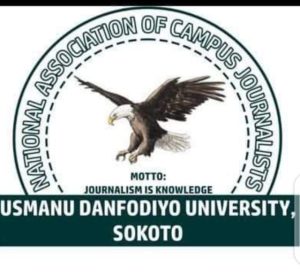By Habeeb Olokooba

Idris Teleti is a 300-level political science student at the Usmanu Danfodiyo University, Sokoto embodies the Danfodites’ spirit of passion for extracurricular activities. Channeling his classroom knowledge into real-world experience, Idris ventured into politics while nurturing a deep admiration for journalism.
Determined to pursue both his passions, he skillfully juggled the dual roles of politician and journalist.
“Right from my secondary school days, I have had an interest in journalism. Its instrumentality of keeping students informed is what makes it attractive to me,” Idris told Digest, (his former board).

Pol-Journo Dreams lacks Longevity
When the 23-year-old Idris joined Digest, he discovered a rule: if you want to do journalism you can’t engage in politics. This realization saddened him and made him feel constrained.
“There is a heading in the digest form that says as a journalist, you can’t participate in politics. This left me bewildered but reflecting on the provision, I realized that one cannot be the two at a time. They best work as different traits in different persons,” Teleti told Digest.
“I had to let go of one dream and upon weighing my choices, I realized I fell in love more with politics than journalism,” He explained.
While journalism remains a sullen dream for him that I t truly materialized—or perhaps did, but not for long—he easily pursued his political ambition.
Similar to Idris, Yaseer Aladodo was once a member of Digest who was sanctioned when he took up a post at the Ilorin Emirate Students Union National Headquarters.
At the time he opted out of Digest, he served as the Social Media manager. However, he had to leave both the post and the board respectively.
“Seriously, I didn’t feel great when I left Digest. Digest used to be my second family and up to date I still hide each time I see any member of my board,” Mr. Yaseer explained to this reporter.
A cross from journalism to politics is not a new thing. Even in conventional practice, it is something permitted. In the late 19th century, William Randolph Hearst shifted from media to US Congress, endorsing “government by journalism”.
Outstanding figures such as Churchill, Mussolini, Éric Zemmour, and Boris Johnson have followed similar paths. Etymologically, journalists have played significant roles in politics, often in less visible capacities.
For instance, British journalist Alastair Campbell became a strategist for Tony Blair. The advent of TV journalism further bridged these two realms, allowing media personalities to leverage their influence for political careers.
In Usmanu Danfodiyo University, Journalism and politics are two interrelated phenomena. With their rivers flowing in the same channel, their water does not mix. So we can say one exists for another.
What the Law Says
Article 28 of the National Association of Campus Journalists (NACJ) UDUS chapter provides for nonpartisan members from any political affiliation. Subsection (1) provides that:
“NACJ members are not eligible to hold any political position within the university, including student union, faculty, or departmental politics, while they are members.”
Subsection (2) says: Journalists within NACJ must maintain a non-partisan position and must not associate with or actively promote any political organization or candidate inside the university, including student unions, faculty, or departmental politics.
Sub (3) provides for a penalty for flaunting the above provision. It reads: “Any NACJ member found to have actively participated in student union, faculty, or departmental politics inside the institution, including holding political office or openly promoting political candidates, would face disciplinary action (a) Disciplinary sanctions may include temporary suspension or permanent removal from active writing tasks within NACJ, as determined by the NACJ Executive Council.
Some press boards on campus which include the News Digest Press Club UDUS have domesticated this law. As the lead press outlet on campus, News Digest sets the record by suspending one of its executives who flaunted the rule and took part in politics.
This is what helps in building boundaries that have long been broken between journalism and politics. has been rightly precluded that other press boards should help by following this footstep as it helps in eradicating corruption in our University community.
Challenges in Law implementation
Speaking with The News Digest, the principal editor of NACJ, Ghazali Ibrahim, mentioned that the essence of the prohibition of pol-journalism, by NACJ, is to keep campus journalists in check and to also prevent the interference of student politicians in journalism.
“As a journalist, you need to uphold the pillars of journalism which contain accuracy, truthfulness, and objectivity. So when a journalist puts these things in mind, he will definitely produce an error-free and perfect journalistic piece,” Mr Ghazali told Digest.
If however, pol-journalism is allowed to thrive, the culprits might not be able to carry out the fundamental duty of a journalist in a Democratic setting. Since it is he who serves as both a politician and reporter, his pen will be reluctant to correct various anomalies,” He continued.
Mr Ibrahim furthered that, as an editor, it will be a good thing if all the five press boards on campus can adhere strictly to this rule. It will help in keeping journalists in check.
“If the five boards can adhere to the rule, it will help in curbing the implementation challenge and birth a transparent system.”
